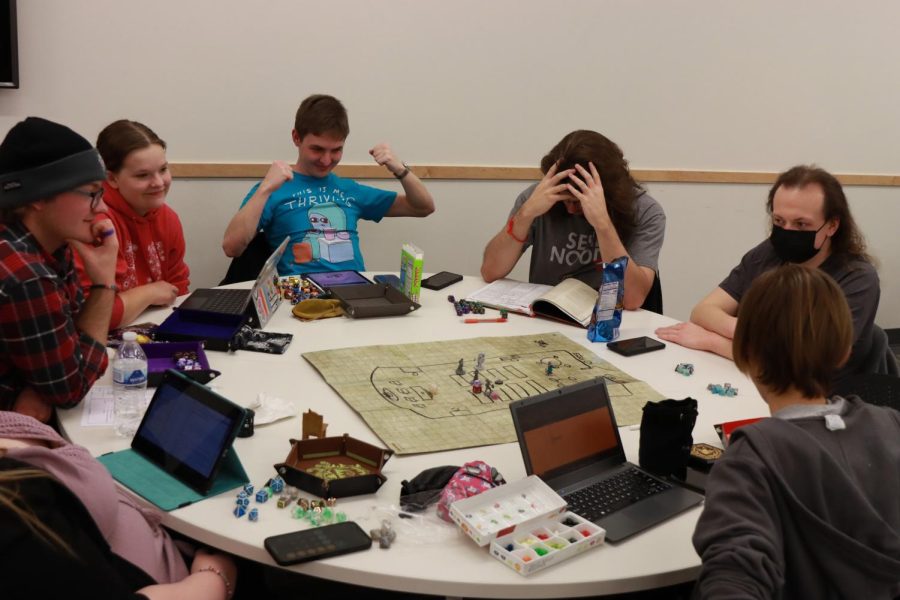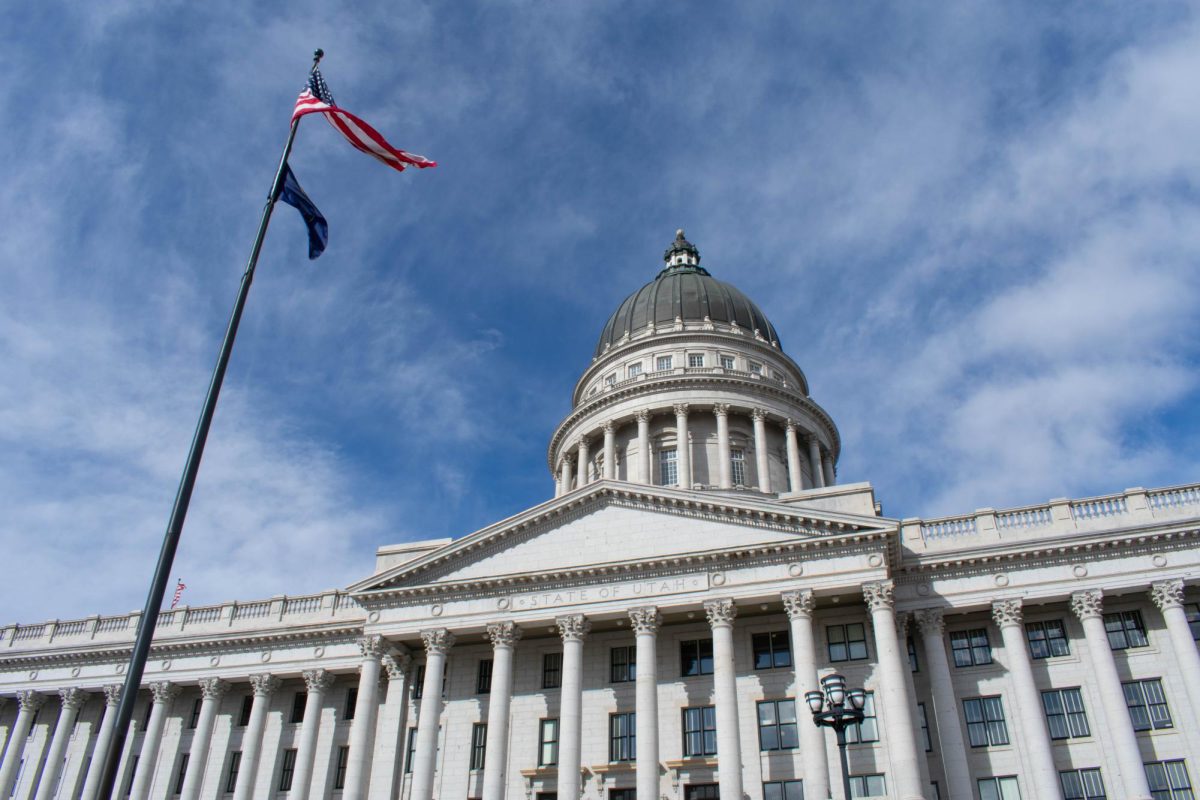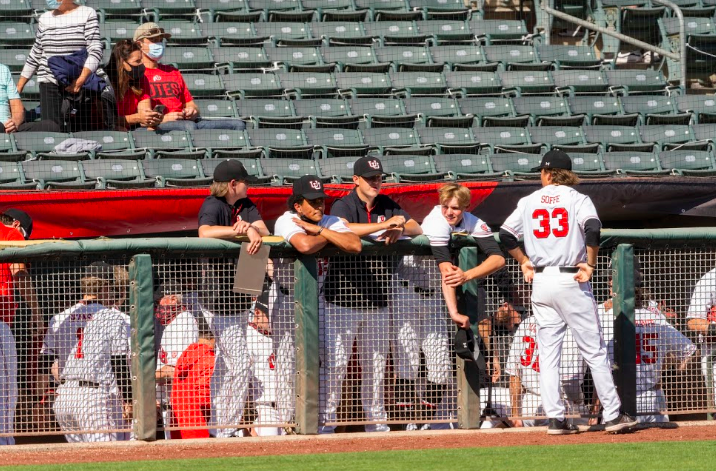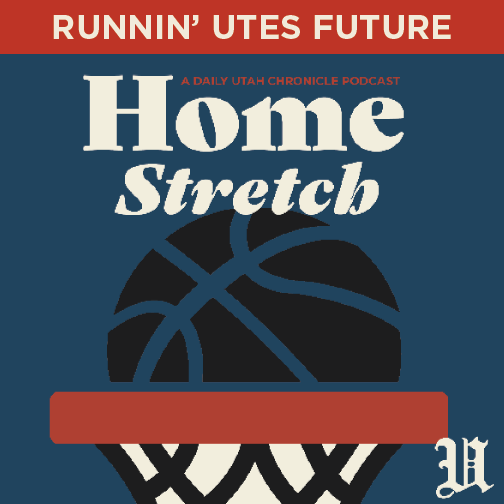D&D Club Offers Community For Students to Be Themselves and Embody Characters
D&D club members show mixed reactions after a failed attack during a raid at the University of Utah in Salt Lake City, Utah on Feb. 3 2023. (Photo by Sarah Karr | The Daily Utah Chronicle)
February 6, 2023
Dungeons & Dragons is a wildly popular tabletop roleplaying game complete with goblins, wizards and of course, dragons. More than 50 million people worldwide have “interacted” with D&D since it was created in the mid-1970s, according to its publisher.
D&D’s fan base reaches far and wide, and the University of Utah is no exception with its own club dedicated to D&D and games like it, aptly named Dungeons & Dragons and Stuff.
The club, which is an offshoot of the larger student organization Crimson Gaming, primarily serves as a space where students interested in playing tabletop RPGs, or role-playing games, can connect with other students and form a group to play.
“The single biggest hurdle, I think, to getting into D&D and tabletop games as a hobby is the fact that you need other people to play them with,” said Evan Parry, fourth-year games major and vice president of the club. “The single biggest thing that we offer is we have a place for people to meet each other.”
Preston Phung, fourth-year games major, is the president of the D&D club and has been involved with it since his freshman year. He said that when he came to the U, he didn’t really know anyone but when looking for clubs to get involved with, found Crimson Gaming and the D&D and Stuff club.
Once a semester, Phung said the club hosts a “campaign recruitment meeting” where various dungeon masters can pitch their D&D party to members of the club, and they can choose which group they want to join for a long-term campaign. He added that about once a month, there are also one-off “raid nights,” where the whole club comes together to play.
Though D&D and Stuff functions differently than most other clubs on campus, Phung said the value of it still lies in community, specifically for people whose interests might be “extremely niche” among the people they know and might want to meet others at college who like the same things.
Additionally, Phung said joining the club and seeing how many other people enjoy tabletop RPGs “shows that you’re part of a much bigger community than you might have otherwise thought.”
Though finding community is a large draw to the club, Parry said the reason most students join is, obviously, to play D&D and other games like it. He added the reason that so many people are drawn to these games is the “collaborative storytelling aspect” and choice in how the narrative plays out that isn’t available in other forms of media.
“D&D is a way for people to kind of scratch that creative itch without feeling the need to commit to something as big as a novel, for instance,” he said. “It’s like, you know, for a few hours a week, I embody this character.”
Parry added this unique gameplay puts tabletop RPGs at “an interesting intersection” of people with varying interests and backgrounds.
“You get people who are coming into this hobby who have a variety of interests that just happen to intersect in that same place,” he said. “And because of that, you end up with a kind of eclectic community that somehow, it still feels like a cohesive community.”
In addition, Parry said games like D&D offer a unique opportunity for people to try on new identities in a relatively safe environment.
He specifically mentioned a time that a player in a campaign he was running chose to play as a queer character because Parry wore a rainbow bracelet to a club meeting, and the player knew it was a safe environment to explore that aspect of himself. Parry added that knowing he and the D&D and Stuff community was a safe space to do that “felt really gratifying.”
Because D&D, and games in general, attract students from so many backgrounds, maintaining equity and inclusion is a major focus for D&D and Stuff and Crimson Gaming.
“The gaming community is made up of pretty much half and half for male-female ratio and there’s a lot of LGBTQ people in the gaming community as well who have found their home here,” said Phung, who is also the community director for Crimson Gaming.
He added that in certain gaming communities, offensive jokes and misogynistic rhetoric are the standard, but in these clubs, he aims to make sure everyone knows those things are unacceptable.
“From whatever background you came from coming to university, you’re gonna meet a lot of people who have different viewpoints than you do or behave differently than you,” he said. “And it’s just trying to foster a home or space of understanding of people from different cultures or backgrounds and making sure that everyone is heard and is in a safe space.”












